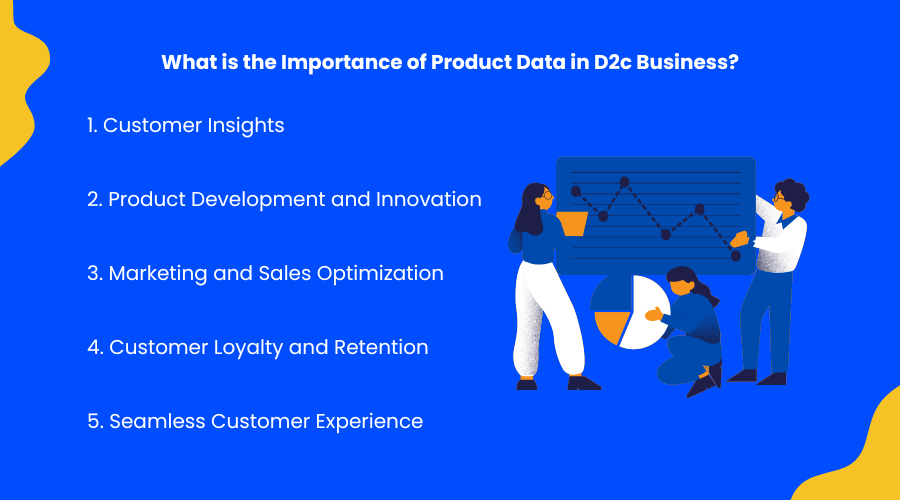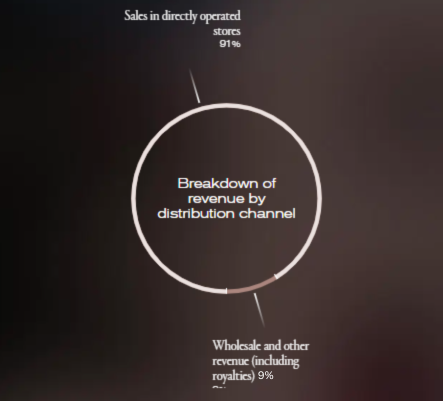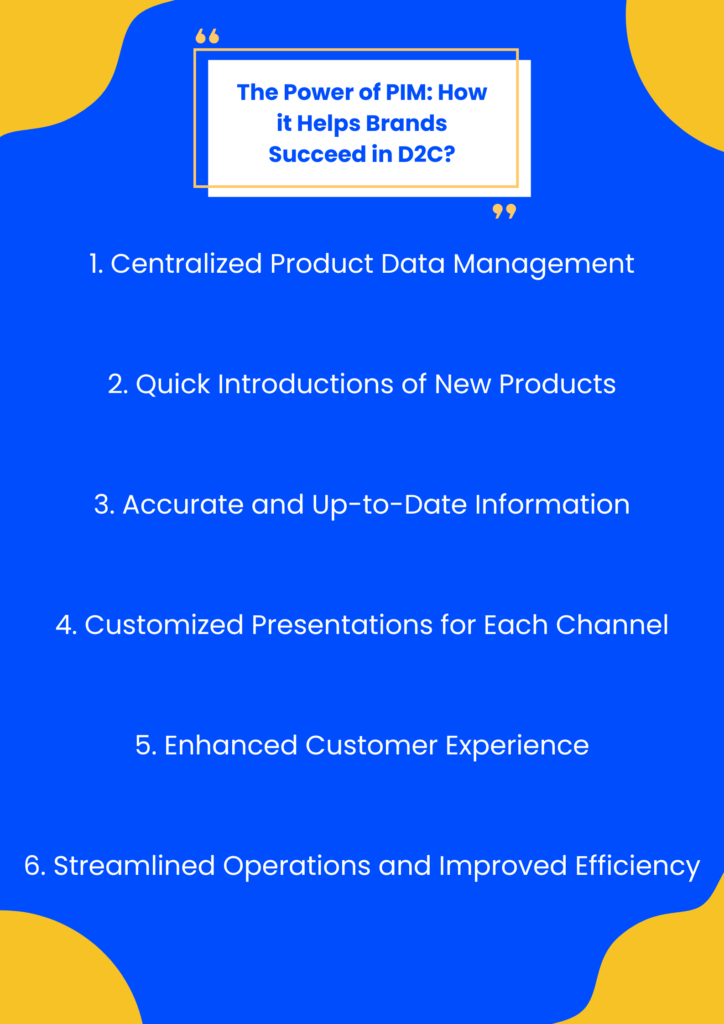In today’s ever-changing business world, brands are finding new ways to reach customers and make them happy. One way they’re doing this is through Direct-to-Consumer (D2CWhat is D2C E-commerce? D2C, also known as direct-to-customer e-commerce, is a retail strategy in which a business markets and sells a product directly to the... More) models.
With the right technology and processes, brands can get really good at using data and do well with D2CWhat is D2C E-commerce? D2C, also known as direct-to-customer e-commerce, is a retail strategy in which a business markets and sells a product directly to the... More, whether they are fancy brands or more regular ones.
In this blog, we will talk about why data is so important for D2CWhat is D2C E-commerce? D2C, also known as direct-to-customer e-commerce, is a retail strategy in which a business markets and sells a product directly to the... More success, what is PIM, and how Product Information Management (PIM) plays a big role.
We will show you how using data and PIM can make brands connect with customers, grow bigger, and be super successful in the exciting world of D2CWhat is D2C E-commerce? D2C, also known as direct-to-customer e-commerce, is a retail strategy in which a business markets and sells a product directly to the... More. So, let’s get started!
What is Direct-to-Consumer (D2c)?
D2CWhat is D2C E-commerce? D2C, also known as direct-to-customer e-commerce, is a retail strategy in which a business markets and sells a product directly to the... More stands for Direct-to-Consumer. It is a business model where brands sell their products directly to customers without using third-party retailers, wholesalers, or agents.
Instead of going through traditional distribution channels, D2CWhat is D2C E-commerce? D2C, also known as direct-to-customer e-commerce, is a retail strategy in which a business markets and sells a product directly to the... More brands establish their own sales channels, such as company-operated retail stores or ecommerce platforms, to directly reach and interact with consumers.
Wholesale Vs. Direct-to-Consumer (D2c)
Wholesale is when brands sell their products in bulk to other stores or online marketplaces. This helps them reach a lot of customers through those stores’ networks.
But it also means they have less control over things like how much their products cost, how they are marketed, and how customers interact with them.
Scale your D2C business and stay competitive with Apimio
Sign up on Apimio PIM for optimized product data management and growth.
In contrast, the D2CWhat is D2C E-commerce? D2C, also known as direct-to-customer e-commerce, is a retail strategy in which a business markets and sells a product directly to the... More lets brands sell directly to customers. They don’t need agents like retailers. This gives them more control over their products’ prices, marketing, and overall customer experience.
They can create their own stores, either physical shops or online websites, to connect directly with customers.
This way, brands can learn more about what customers like and tailor their products and services to make customers happy.
What is the Importance of Product Data in D2c Business?
In the world of Direct-to-Consumer (D2CWhat is D2C E-commerce? D2C, also known as direct-to-customer e-commerce, is a retail strategy in which a business markets and sells a product directly to the... More) business, data plays an important role in determining success.
In this modern digital era, data has become a valuable asset for brands looking to thrive in the competitive market and establish closer connections with their customers.

Here’s why product data is so important for D2CWhat is D2C E-commerce? D2C, also known as direct-to-customer e-commerce, is a retail strategy in which a business markets and sells a product directly to the... More success;
1. Customer Insights
Data provides valuable insights into customer behavior, preferences, and buying patterns.
By analyzing this information, D2CWhat is D2C E-commerce? D2C, also known as direct-to-customer e-commerce, is a retail strategy in which a business markets and sells a product directly to the... More brands can better understand their target audience, anticipate their needs, and tailor their products and marketing strategies accordingly.
2. Product Development and Innovation
Data enables D2CWhat is D2C E-commerce? D2C, also known as direct-to-customer e-commerce, is a retail strategy in which a business markets and sells a product directly to the... More brands to gather feedback and opinions directly from customers.
By collecting and analyzing this feedback, brands can identify areas for improvement, refine product offerings, and develop innovative products that align with customer expectations.
3. Marketing and Sales Optimization
Data-driven marketing and sales strategies are highly effective in the D2CWhat is D2C E-commerce? D2C, also known as direct-to-customer e-commerce, is a retail strategy in which a business markets and sells a product directly to the... More space.
Brands can use data analytics to identify the most suitable marketing channels, target specific customer segments, and optimize their marketing spend for better returns on investment (ROI).
4. Customer Loyalty and Retention
Through data analysis, D2CWhat is D2C E-commerce? D2C, also known as direct-to-customer e-commerce, is a retail strategy in which a business markets and sells a product directly to the... More brands can identify and engage with loyal customers more effectively.
Brands can implement loyalty programs, rewards, and personalized offers based on past purchase behavior, encouraging customers to return for future purchases.
5. Seamless Customer Experience
Data integration across different touchpoints (such as online platforms and physical stores) ensures a consistent and seamless customer experience.
D2CWhat is D2C E-commerce? D2C, also known as direct-to-customer e-commerce, is a retail strategy in which a business markets and sells a product directly to the... More brands can track customer interactions and preferences across channels, allowing for a unified and personalized shopping journey.
The Rise of D2C: Why Brands Prefer Selling Directly to You?
In recent times, more and more brands, both fancy ones and everyday ones, are choosing a different way to sell their products directly to you. This approach is called Direct-to-Consumer, or D2CWhat is D2C E-commerce? D2C, also known as direct-to-customer e-commerce, is a retail strategy in which a business markets and sells a product directly to the... More for short.
Before, fancy brands used to mostly rely on selling their products to big retailers. But things have changed. Now, they are focusing on selling directly to you through their stores or websites.
This helps them give you a more personal and special shopping experience. By doing this, they can also control how they present their brand and products to you, making it more unique and exciting.
Even everyday brands are joining in on the D2CWhat is D2C E-commerce? D2C, also known as direct-to-customer e-commerce, is a retail strategy in which a business markets and sells a product directly to the... More trend. They find that connecting with you directly helps them show what makes them different and build a strong connection with you.
Plus, it makes their marketing and sales strategies work better, which means they can make more money.
So, whether you’re buying fancy stuff or everyday items, brands are choosing D2CWhat is D2C E-commerce? D2C, also known as direct-to-customer e-commerce, is a retail strategy in which a business markets and sells a product directly to the... More to bring you a special and personalized shopping experience, while also making their businesses stronger.
Examples of High-Profile Brands Prioritizing D2C
The shift towards D2CWhat is D2C E-commerce? D2C, also known as direct-to-customer e-commerce, is a retail strategy in which a business markets and sells a product directly to the... More can be observed in various high-profile brands that have openly expressed their commitment to this model.
1. LVMH (Moet Hennessy Louis Vuitton)

- LVMH, a luxury goods conglomerate, embraces D2CWhat is D2C E-commerce? D2C, also known as direct-to-customer e-commerce, is a retail strategy in which a business markets and sells a product directly to the... More as its primary sales channel.
- The premium Fashion and Leather Goods segment of LVMH generated 95% of revenue from D2CWhat is D2C E-commerce? D2C, also known as direct-to-customer e-commerce, is a retail strategy in which a business markets and sells a product directly to the... More in 2022.
- LVMH focuses on building direct relationships with customers and controlling the customer experience.
2. Inditex (Zara)

- Inditex, the parent company of Zara, strategically integrates D2CWhat is D2C E-commerce? D2C, also known as direct-to-customer e-commerce, is a retail strategy in which a business markets and sells a product directly to the... More channels.
- Zara delivers trend-driven fashion directly to customers, reducing reliance on third-party retailers.
- D2CWhat is D2C E-commerce? D2C, also known as direct-to-customer e-commerce, is a retail strategy in which a business markets and sells a product directly to the... More allows Zara to be more agile and responsive to customer preferences.
3. Kering (Gucci, Saint Laurent, Bottega Veneta)

- Kering, a French luxury group, places D2CWhat is D2C E-commerce? D2C, also known as direct-to-customer e-commerce, is a retail strategy in which a business markets and sells a product directly to the... More at the forefront of its strategy.
- 91% of Kering’s revenue was generated through D2CWhat is D2C E-commerce? D2C, also known as direct-to-customer e-commerce, is a retail strategy in which a business markets and sells a product directly to the... More channels as of April 2023.
- D2CWhat is D2C E-commerce? D2C, also known as direct-to-customer e-commerce, is a retail strategy in which a business markets and sells a product directly to the... More enables Kering to engage with consumers directly and gather valuable insights.
The Power of PIM: How it Helps Brands Succeed in D2C?
Product Information Management, or PIM, is a tool that helps brands manage all the important information about their products.
It’s like a central hub where brands keep track of details like product descriptions, images, sizes, colors, and more.
PIM, or Product Information Management, is a key factor in achieving success with the Direct-to-Consumer (D2CWhat is D2C E-commerce? D2C, also known as direct-to-customer e-commerce, is a retail strategy in which a business markets and sells a product directly to the... More) model.
It plays a crucial role in managing product data efficiently and effectively, enabling brands to excel in their D2CWhat is D2C E-commerce? D2C, also known as direct-to-customer e-commerce, is a retail strategy in which a business markets and sells a product directly to the... More strategies.

Here’s how PIM empowers brands to succeed in the D2CWhat is D2C E-commerce? D2C, also known as direct-to-customer e-commerce, is a retail strategy in which a business markets and sells a product directly to the... More landscape;
1. Centralized Product Data Management
PIM acts as a central repository where brands can store and organize all their product information in one place. This includes product descriptions, images, specifications, pricing, availability, and more.
With a single source of truth for product data, brands can ensure consistency across all sales channels, both physical stores and online platforms.
2. Quick Introductions of New Products
D2CWhat is D2C E-commerce? D2C, also known as direct-to-customer e-commerce, is a retail strategy in which a business markets and sells a product directly to the... More brands often need to introduce new products quickly to meet customer demands and market trends.
PIM facilitates the speedy creation and management of product listings, making it easier to showcase new offerings to customers promptly.
This act gives brands a competitive edge in launching products faster than their competitors.
Ready to make data-driven decisions for your D2C strategy?
Let Apimio Experts be your guide to success in the ever-evolving world of D2C commerce.

3. Accurate and Up-to-Date Information
In D2CWhat is D2C E-commerce? D2C, also known as direct-to-customer e-commerce, is a retail strategy in which a business markets and sells a product directly to the... More, providing accurate and up-to-date product information is essential.
PIM helps brands keep track of changes and updates in real time, ensuring that customers always receive the most relevant and reliable details when making purchasing decisions.
This reduces the risk of errors and returns, enhancing customer satisfaction.
4. Customized Presentations for Each Channel
D2CWhat is D2C E-commerce? D2C, also known as direct-to-customer e-commerce, is a retail strategy in which a business markets and sells a product directly to the... More brands often sell their products through various sales channels, such as their website, mobile app, or physical stores.
PIM allows brands to tailor product presentations and information to suit the unique requirements of each channel.
This personalization ensures a consistent and optimized shopping experience for customers across different touchpoints.
5. Enhanced Customer Experience
A seamless and personalized customer experience is crucial for D2C’s success.
PIM ensures that customers receive consistent and accurate product information, whether they shop online or in-store.
This cohesive experience builds trust and loyalty, encouraging customers to return and recommend the brand to others.
6. Streamlined Operations and Improved Efficiency
By managing product data through PIM, brands can streamline their internal processes. This includes automating workflows, reducing manual data entry, and minimizing errors.
As a result, brands can save time and resources, allowing their teams to focus on other critical aspects of the business.
How PIM Unifies Product Data Across Store and Web Channels in D2C?
In the world of D2CWhat is D2C E-commerce? D2C, also known as direct-to-customer e-commerce, is a retail strategy in which a business markets and sells a product directly to the... More, brands often sell their products through both physical stores and online websites.
PIM plays a vital role in connecting these different sales channels by bringing all the product data together in one place.
This ensures that customers receive a consistent and seamless shopping experience, regardless of whether they purchase in-store or online.
PIM empowers brands with valuable insights into customer preferences and behavior.
By analyzing the data gathered from various touchpoints, brands can better understand what customers like and what resonates with them.
This information allows brands to make data-driven decisions, fine-tuning their products and marketing strategies to cater to their target audience better.
For example, if certain products receive more attention and positive feedback online, brands can leverage this information to promote them more prominently in their physical stores as well.
Similarly, if specific product attributes or features are popular among customers, brands can highlight these in their marketing campaigns to drive more sales.
Leverage Apimio PIM to Enhance D2C Relationships and Revenue
As D2CWhat is D2C E-commerce? D2C, also known as direct-to-customer e-commerce, is a retail strategy in which a business markets and sells a product directly to the... More gains prominence, brands are discovering the immense potential of PIM in optimizing their relationships with customers and boosting revenue.
Apimio PIM provides a robust solution for efficiently managing product data, ensuring accurate and consistent information is delivered to customers across all sales channels.
This reliability builds trust and loyalty, fostering stronger relationships and encouraging repeat business.
With Apimio, brands can gain the ability to swiftly introduce new products to the market, respond to shifting market demands, and customize their offerings to align with customer preferences.
These capabilities drive increased revenue and fuel business growth in the dynamic D2CWhat is D2C E-commerce? D2C, also known as direct-to-customer e-commerce, is a retail strategy in which a business markets and sells a product directly to the... More landscape.
Apimio’s user-friendly interface and comprehensive features empower brands to maintain a centralized repository of product information.
This ensures that all teams and channels have access to the latest, most up-to-date data, avoiding discrepancies and enhancing the overall customer experience.
Conclusion
In conclusion, the Direct-to-Consumer (D2CWhat is D2C E-commerce? D2C, also known as direct-to-customer e-commerce, is a retail strategy in which a business markets and sells a product directly to the... More) approach is changing how brands connect with customers. To succeed, they need to be smart with their data and use the PIM system.
Apimio helps brands manage product information effectively, making sure it’s accurate everywhere. This builds trust with customers and boosts sales.
With Apimio, brands can quickly introduce new products, customize presentations for different sales channels, and use data to make smart decisions.
In the competitive D2CWhat is D2C E-commerce? D2C, also known as direct-to-customer e-commerce, is a retail strategy in which a business markets and sells a product directly to the... More world, Apimio PIM is a powerful tool that helps brands deliver personalized experiences, build strong customer relationships, and achieve impressive growth. It’s the secret to D2CWhat is D2C E-commerce? D2C, also known as direct-to-customer e-commerce, is a retail strategy in which a business markets and sells a product directly to the... More success!
What to do next?
- Have questions or need assistance? Reach out to our dedicated support team, ready to provide expert guidance and support throughout your product data journey.
- Stay updated and gain valuable insights into product data management by exploring our informative blog posts.
- Take the next step towards efficient product management – sign up for Apimio’s PIM software and unlock the full potential of your product data.
Frequently Asked Questions
D2CWhat is D2C E-commerce? D2C, also known as direct-to-customer e-commerce, is a retail strategy in which a business markets and sells a product directly to the... More stands for Direct-to-Consumer, where brands sell their products directly to customers without involving third-party retailers.
PIM centralizes product data, ensures consistency, and allows brands to customize presentations for different channels, leading to a seamless shopping experience.
D2CWhat is D2C E-commerce? D2C, also known as direct-to-customer e-commerce, is a retail strategy in which a business markets and sells a product directly to the... More fosters customer loyalty by offering personalized experiences, direct customer interactions, and reliable product information, leading to repeat business and brand loyalty.
Brands are moving towards D2CWhat is D2C E-commerce? D2C, also known as direct-to-customer e-commerce, is a retail strategy in which a business markets and sells a product directly to the... More to establish closer customer relationships, have better control over sales, and capture more profits.



